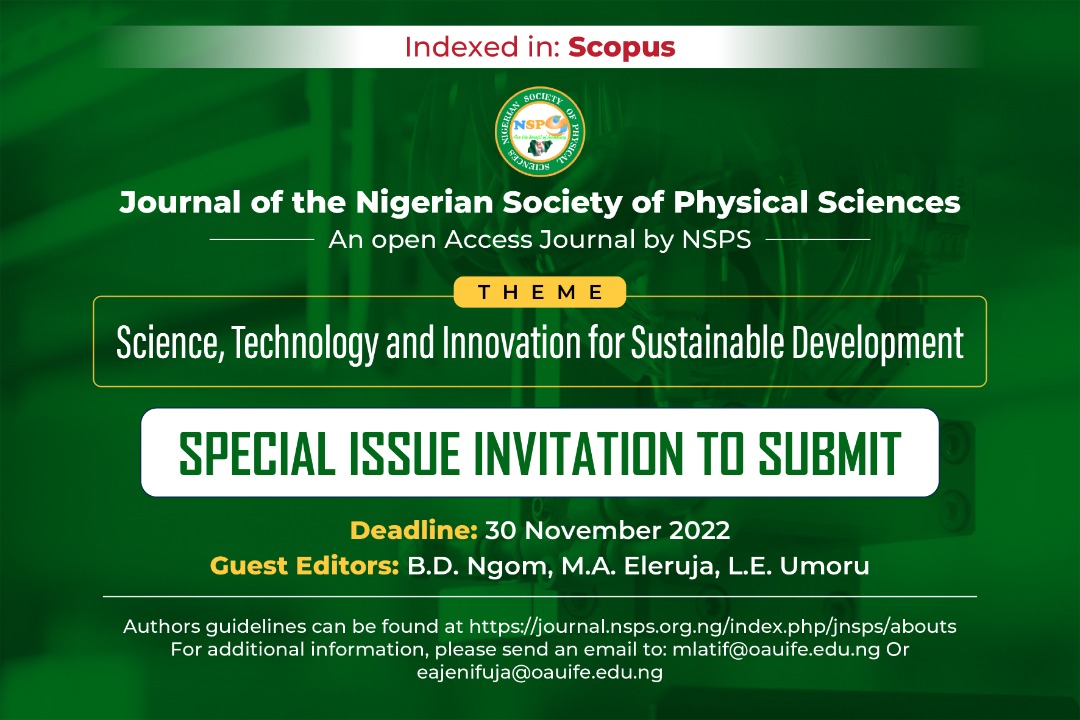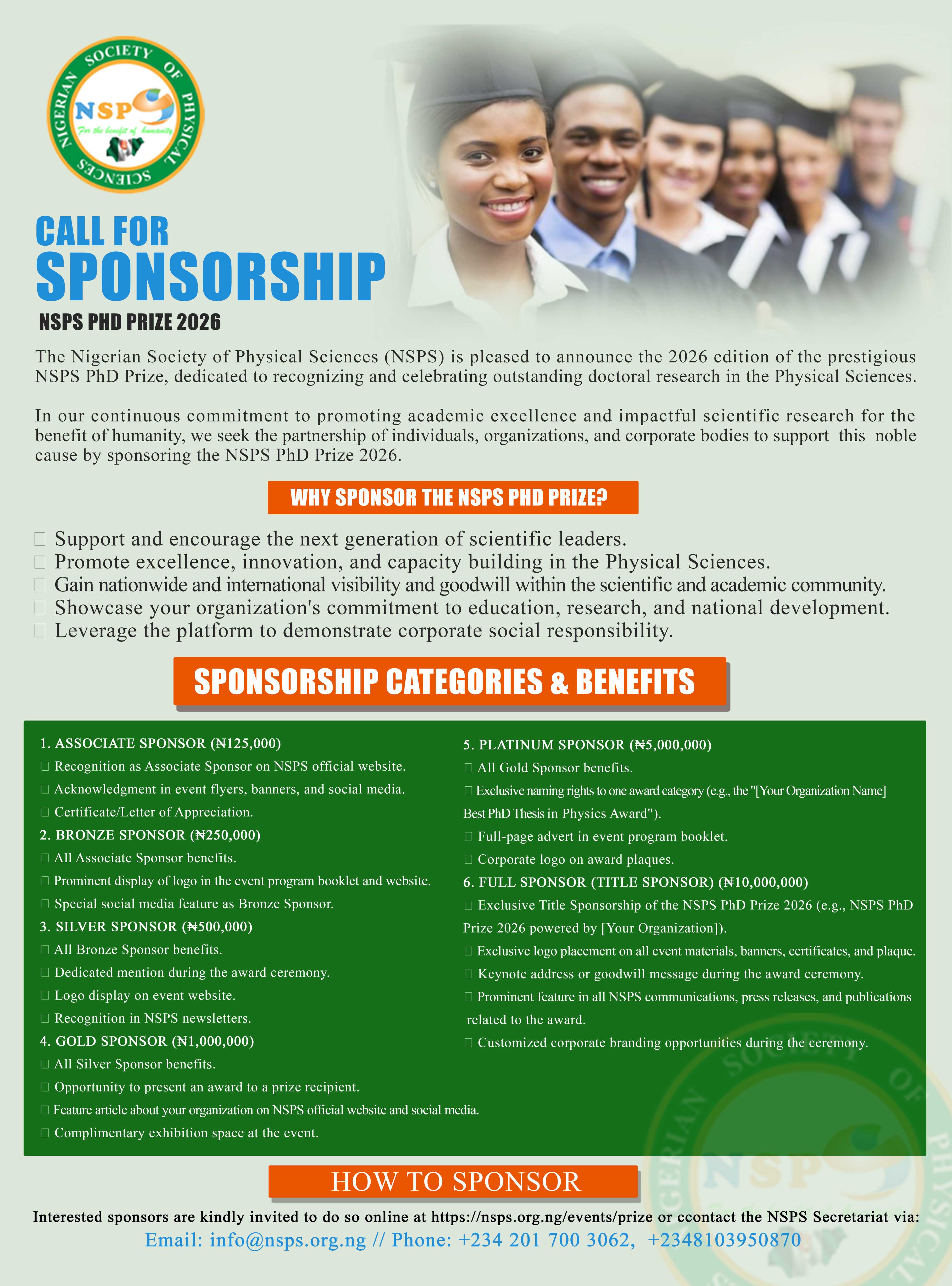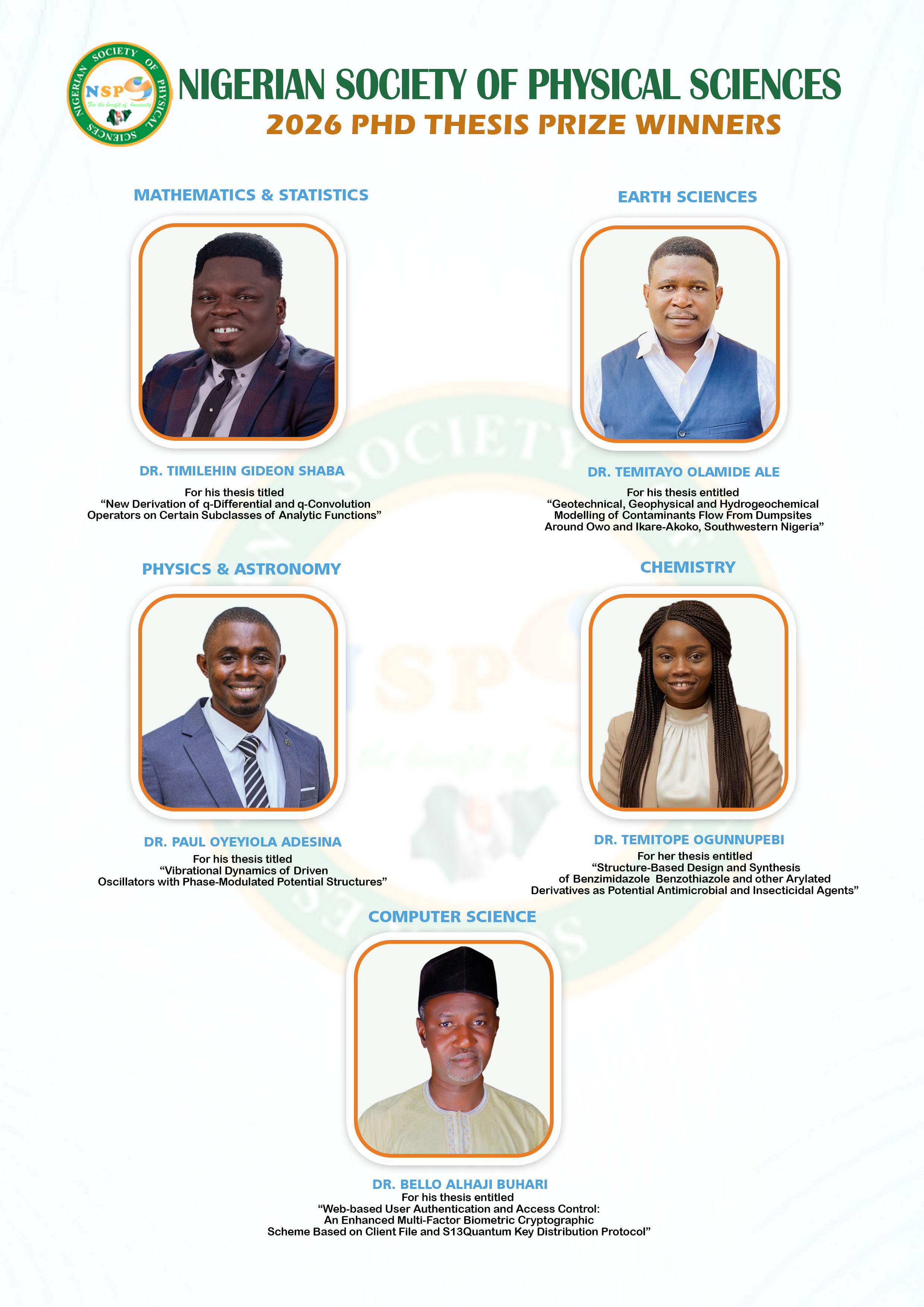Specia Issue : Science, Technology, and Innovation for Sustainable Development (3rd biennial AScIN conference held between 25 – 29 July, 2022 at the Centre for Energy Research and Development, Obafemi Awolowo University, Ile-Ife, Nigeria)

Preamble
The African Science Integration Network (AScIN) is a platform that seeks to bring African scientists together with a view to making bigger impact in the development of science on the continent through collaboration, exchanges of ideas and facilities. The focus areas of the network are in physical sciences: physics, mathematics, chemistry, geology, etc. The objectives of the network include among other, to contribute to the development of science and technology on the continent, create international framework for exchanges, meetings and information sharing both locally and internationally, contribute to the valorization, dissemination and use of the scientific results, develop partnership with organizations and associations pursuing same objectives, etc. AScIn was unveiled with its first biennial conference which held at the Université de Lomé, Togo in July 2018. A second edition was also held at the Université de Lomé although online owing to Covid19 restrictions. The third edition held at the Centre for Energy Research and Development, Obafemi Awolowo University, Ile-Ife between 25-29 July, 2022.
Background
For over half a century that most African nations have become independent, the use of science has been a cornerstone for improvement of quality of life and consequently has converged our ways of life despite differences in cultures and inherited values. This feat has been greatly facilitated by international organs of the United Nations in various areas like Education, Health, Food, Security, etc. Despite the large deposits of solid minerals and a huge human capital dominated by the youth, the use of science for the betterment of the living conditions of African citizens is far from making the desired impact as fundamental challenges such as hunger, unemployment, insecurity, lack of energy, etc. have yet to become a thing of the past for a vast majority of countries in Africa. The disconnect between the theoretical formulation of problems which is fully embedded into the concept of SCIENCE, and its direct application for solving all practical challenges ranging from a safe and efficient tapping of the solid minerals that the continent is endowed with, to the use of the latest available technological tools, fully embedded into the concept of TECHNOLOGY is still of concern. Original and well-thought-out policies based on African realities are prerequisites for meeting these challenges.
We invite researchers to submit original research articles to this Special Issue aim to identify latest research in this research direction that have demonstrated to have a great impact in Physical Sciences. Manuscripts can be related to any aspect of the following (but not limited to):
- Remote Sensing
- Drone Development and Applications
- Sensors and smart materials
- Renewable energy – solar, wind,
- Fuel cells, energy harvesters and storage
- Biofuel
- Graphene and 2-D materials
- Energy management
- Energy research and development
- Power generation, transmission and distribution
- Materials synthesis and characterisation
- Nanostructures and devices
- Nanoparticle synthesis and manufacturing innovations
- Photonic materials and devices
- Corrosion inhibitors
- Wear resistant coatings
- Composite materials
- Polymers: Sustainability, processes, applications and characterisation
- Nanoscience in extraction metallurgy
- Modern theoretical analysis and experimental research technics
- Computational simulation and modeling.
- Mitigations against climate change
- Materials for oil spillage management
- Waste management and recycling
- Desertification control
- Environmental characterisation
Manuscript Submission Information
Guidelines for preparation of manuscripts can be found online at https://journal.nsps.org.ng/index.php/jnsps/about/guidelines-for-authors. Manuscripts can be submitted until the deadline. All papers will first undergo initial assessment by the Editor-in-Chief for suitability in JNSPS and further assessment for compliance with JNSPS standard by the guest editors. All manuscripts would be peer-reviewed and accepted papers will be published continuously in the journal (as soon as accepted) and will be listed together on the special issue website.
Submitted manuscripts should not have been published previously, nor be under consideration for publication elsewhere. All manuscripts are thoroughly refereed through a single-blind peer-review process. A guide for authors and other relevant information for submission of manuscripts is available on the Instructions for Authors page (https://journal.nsps.org.ng/index.php/jnsps/about/guidelines-for-authors).
Please be reminded that JNSPS is an open-access journal, so authors make a commitment to publish an article as gold open access under a Creative Commons Attribution (CC-BY) license. This option requires an article publication charge (APC) of NGN 25,000 Naira (Nigeria) / 80 USD (Rest of the Word) as an active member of the Nigerian Society of Physical Sciences or 40,000 Naira (Nigeria) /140 USD (Rest of the Word) as a non-member/non-active member of the Nigerian Society of Physical Sciences.
Lead Guest Editor
Prof. Balla Diop Ngom hails from the West African nation of Senegal. He holds an undergraduate degree in solid state physics, photonics and fluid dynamics from the Université Cheikh Anta Diop de Dakar (UCAD), Dakar, Senegal. His keen interest led him to complete doctoral studies in Physics at the same university, which culminated in a Magna Cum Laude merit award for his novel research on the microstructure and optical properties of thin films and nanorods of W-doped ZnO prepared by pulsed laser deposition. His dedication and commitment to the field has led him to pursue a second PhD with the University of the Western Cape (UWC), Cape Town, South Africa. As a result of these distinguished academic achievements, Balla has gained some 10 years of in-depth knowledge and experience in the multi-disciplinary field of Nanosciences, with a specific focus on photonics, optics, Energy and smart Nanomaterials.
Prof. Ngom has produced substantial ISI scientific publications and served as a reviewer in ISI journals such Applied Surface Science, Materials Sciences and Engineering B, Lasers and Optics in Engineering …etc. He is involved in numerous international co-operation programs in Nanosciences with an obvious focus on Nanophotonics and novel multifunctional materials. Being involved in numerous international, Dr Ngom is the Communication officer of the Nanosciences African Network as well as the Editor of the NanoAfnet representative in the international Cooperation Partner Countries Nanosciences Network (ICPCNanoNet) Nanoarchives. Dr Ngom has and is involved in direct co-supervision of an extensive postgraduate students from Africa through the ICTP, NanoAfnet and African Laser Centre funded programs at iThemba LABS in Cape Town, South Africa as well as at the UNESCO-UNISA Chair in Nanosciences and Nanotechnology.
In an attempt to take part in the fascinating Nanoworld, and to contribute to its ambitious challenges, Dr Ngom have conducted several postdoctoral position, he has conducted a postdoctoral position at the INRS_EMT in Canada, before returning to South Africa where he served for 2 years as a postdoctoral position at the Nanosciences Laboratories of iThemba LABS before joining the University of South Africa (UNISA) for his third postdoctoral position. Dr Ngom is an associate of the UNESCO-UNISA Chair in Nanosciences et Nanotechnologies hosted at the University of south Africa, Pretoria, South Africa and currently employed at the Université Cheikh Anta Diop de Dakar, Dakar, Senegal where he is a Associate Professor and Director of the Laboratoire de Photonique Quantique d’Energie & NanoFabrication. Prof Ngom is a Future Leaders – African Independent Research (FLAIR, a project funded by the Royal Society of UK in partnership with the African Academy of Sciences.
Additionally, Prof Ngom has also developed strong entrepreneurial instincts, which have not only led to several awards, but have also guided his research to yield devices with commercial potential. His greatest strengths match those most necessary for creating a cutting edge multi-disciplinary research in the dynamic of novel nanostructured materials/methods for applied nanotechnology.
Guest Editors
1. ELERUJA, Marcus Adebola
Prof. Marcus Adebola Eleruja hails from Lagos state, Nigeria. He obtained a first degree in Physics Education and an MSc. in Physics from the University of Ilorin and a PhD degree in solid state physics from Obafemi Awolowo University, Ile-Ife, Nigeria. Professor M.A. Eleruja is a seasoned academic with a lot of academic impact within and outside the shores of his University base, the Obafemi Awolowo University, Ile-Ife. Within the University, he has served as the Head of the Department of Physics and Engineering Physics from August, 2015 to July, 2019 and also as Vice-Dean, Science (April, 2012 – May, 2014) and Dean, Faculty of Science (August 1st, 2019 – July 31st, 2021). Prof. M.A. Eleruja has taught course at undergraduate and postgraduate levels in the Department of Physics and Engineering Physics for over 30 years and has supervised within the University at both levels over the same period. Prof. M.A. Eleruja is a member of the following bodies:
(i) Member of Nigerian Institute of Physics.
(ii) Member of Science Association of Nigeria.
(iii) Member, Materials Society of Nigeria.
(iv) Member, Solar Energy of Nigeria.
Prof. M.A. Eleruja won the visiting Fellow award of Princeton Institute for the Science and Technology of Materials (PRISM), from August – October, 2007.
2. UMORU Lasisi Ejibunu
Prof. L.E. Umoru is a professor of Materials Science who hails from Kogi state, Nigeria. He had his first degree in Materials Science and Technology, an MSc. degree in Metallurgical and Materials Engineering and a PhD in Metallurgical and Materials Engineering, from Obafemi Awolowo University, Ile-Ife, in 1986, 1990 and 2001, respectively. Since 2011, Prof. L.E. Umoru has been a member of the University Senate having been raised to the level of full professor in the University. He had previously served as the Active Head of the Department of Metallurgical and Materials Engineering between 2006 - 2010. Prof. L.E. Umoru is an active member of the following academic bodies:
(i) Council for the Regulation of Engineering in Nigeria (COREN) R.6407
(ii) Nigerian Society of Engineers (N.S.E.) R.06788
(iii) Nigerian Metallurgical Society. C-430.
(iv) Materials Science and Technology Society of Nigeria (FMSN)
Prof. L.E. Umoru has published over 50 research articles in high impact leading journals in his field and has trained several undergraduate and postgraduate students within the University through teaching and research supervision. He has also served as external examiners in various universities within and outside Nigeria.






